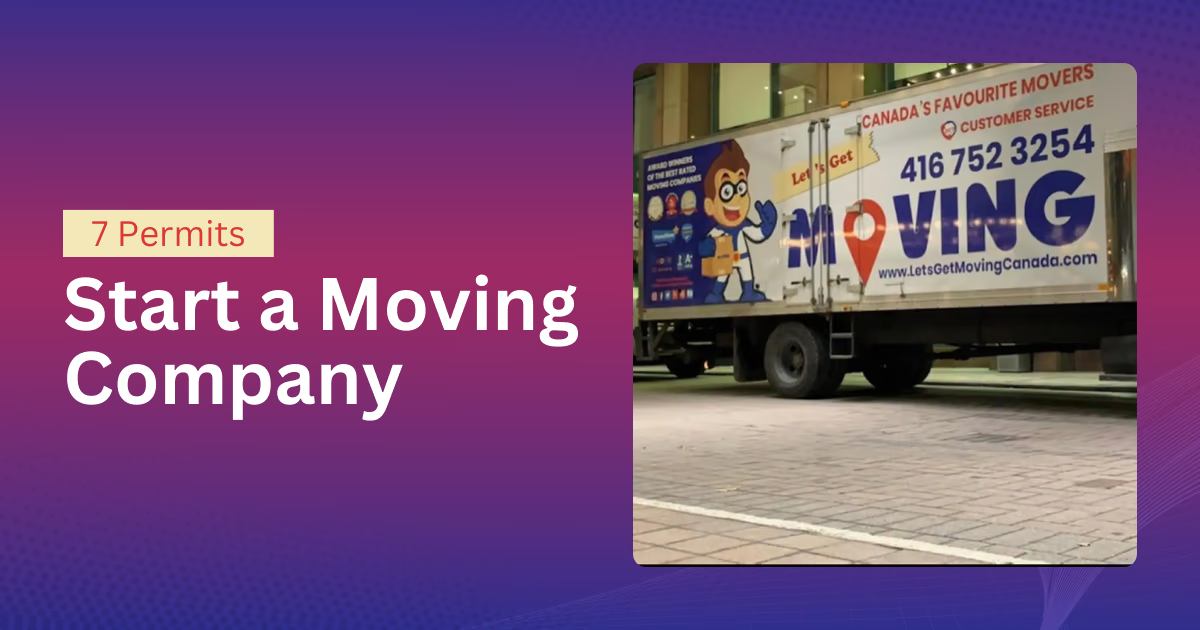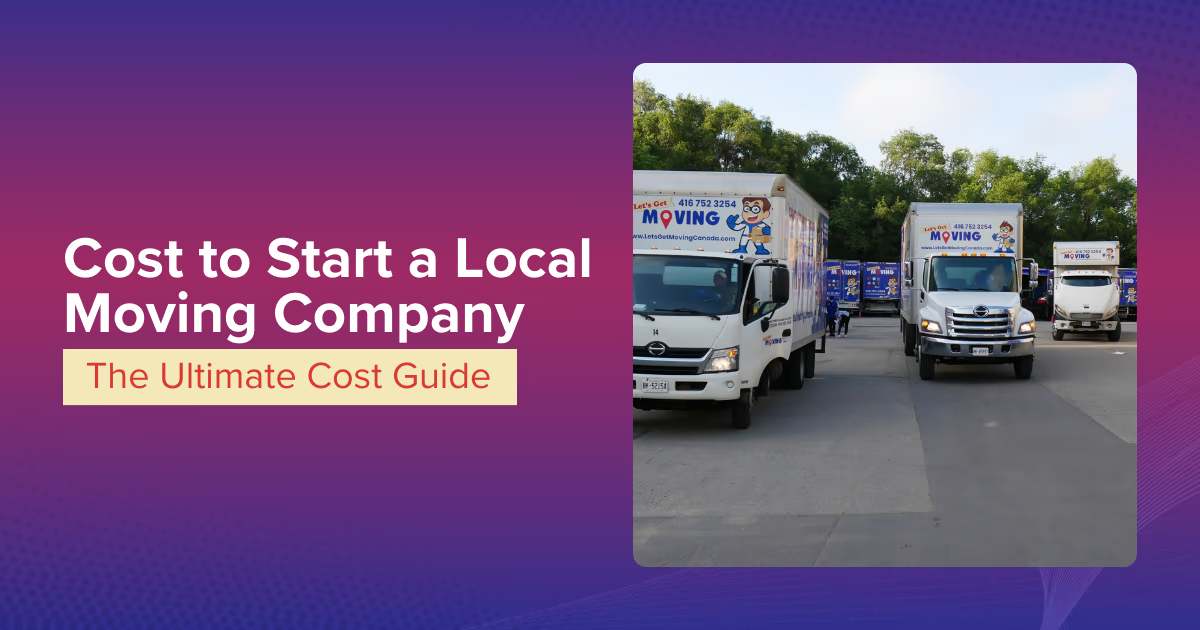Do moving companies make money?
As a moving company in operation for over 13 years, we know they do; however, only some know how moving companies make money and how they can increase profitability.
A full-service, local moving company like ours primarily generates revenue by providing a wide range of moving services, including packing, loading, transporting, unloading, and unpacking belongings during relocation.
Charges for these services depend on factors such as the distance of the move, the size and weight of the move, additional services requested, and the level of convenience desired by the customer.
In addition, moving companies offer ancillary services and products to make the customers’ lives easier, such as packing materials, storage, and junk removal solutions, specialty services like pool table and piano moving, and delicate art handling.
In this article, we show you how full-service moving companies like Let’s Get Moving make money.
10 Ways Moving Companies Make Money
Typically, moving companies will offer multiple products and services beyond just relocating goods and belongings for individuals, businesses, or government entities.
Here are some key ways moving companies generate revenue:
-
-
Transportation Services:
The core service involves transporting stuff from one location to another.
There are two types of moves: locally (within a city or to a nearby town) and long-distance (from one state to another).
The pricing structure for moving services can vary based on distance, weight, volume, time, and additional services provided. It’s common for moving companies to provide estimates based on these factors to give customers an idea of the overall cost of their services.
You may be reading this because you are contemplating opening your own moving company or investing in a franchise. At Let’s Get Moving, the franchisees of our locally-focused moving company can expect about a 25-30% profit margin on basic moves.
-
Packing and Unpacking Services:
Many moving companies offer packing and unpacking services as an additional service. They provide packing materials, pack the belongings, and unload and unpack them at the destination.
Packing and unpacking services add convenience for customers and increase the overall cost of the move, which means more profit for the company.
For example, we charge hourly for packing and unpacking, so the profit margin is the same as our basic moving. Other companies may differ.
-
Storage Services:
Some moving companies provide storage facilities for customers needing to store their belongings temporarily. This service generates revenue through storage fees.
According to Storganise, a self-storage automation software, the profit margin in self-storage typically hovers around 41 percent.
-
Specialized Services:
Certain items, such as pianos, antiques, or fragile items, may require special handling or equipment. Moving companies can execute these single-item moves and charge for these specialized services, which may require additional care and expertise.
Specialized services demand special prices. Either the company provides an estimated cost for the whole move or charges hourly; both ways are profitable for the moving company.
-
Sell Moving and Packing Supplies Online:
Moving company owners can make money “in their sleep” by creating an e-commerce store to sell packing supplies, moving boxes, and other packing supplies.
-
Additional Fees:
Moving companies may charge extra fees for various reasons, such as stair fees, long-carry fees, or fees for moving oversized items. These fees contribute to the overall revenue stream.
-
Corporate Relocation Services:
Some moving companies specialize in corporate relocation, assisting businesses in moving their offices or employees. General business relocation can involve physical moving services, logistics planning, and coordination.
Additional services a moving company could offer include dedicated IT and data security expertise for transporting offices full of electronics and sensitive materials. Although you may need to hire this specialized expertise, moving companies can make good money by incorporating these additional services.
-
International Moving Services:
Moving companies that offer international relocation services can efficiently handle the complexities of moving belongings across borders.
International moving often involves customs documentation, shipping, and coordination with global partners. Because of the complex nature of cross-country moves, customers tend to hire experts and pay a generous amount for moving companies that can execute such relocations.
-
Fleet Rental:
Some moving companies rent out their vehicles for DIY moves. Customers can rent a truck and handle the packing, loading, and unloading.
Fleet rental services generate additional revenue through renting trucks and moving equipment and do not require paying professional movers.
-
Government Contracts:
Moving companies may secure contracts with government agencies for relocation services, such as military personnel moves.
Such contracts generate regular, ongoing revenue for moving companies that become the vendors of record for such services.
-
6 Simple Ways to Increase Your Moving Business Profits
Now that you know the ten main ways moving companies make a profit, here are some ways to increase profits or save money on expensive things like fuel.
-
Network your way to high-quality leads:
Go to events where real estate agents gather. These are great places to find people who might need your services. Use a CRM system to track which sources give you the best leads.
-
Follow up automatically:
Use email and text messages to check in with potential customers automatically. Incorporating a CRM for customer relationship management like SmartMoving can help turn more leads into paying clients.
-
Find opportunities to upsell products and services:
When someone hires you for a move, see if they want to buy packing supplies or extra insurance, the sale of which can add to your profits without much additional effort.
-
Reward loyal customers:
If someone hires you more than once, give them a discount on their next move to keep them coming back or to give them more reason to recommend you, saving you money on finding new customers.
-
Save on fuel:
Gas is expensive, so try to use less of it. Use fuel discount (loyalty) cards, plan efficient routes, and keep your trucks in good shape to save on gas money.
-
Hire part-time help:
Instead of hiring full-time employees all year round, consider hiring people part-time, especially during slower times. This tactic can save you money when business is slow.
How Much Money Do Moving Companies Make?
According to a report from IBIS World, the average profit margin for the moving industry is approximately 4.3 percent, meaning moving companies typically profit about 4.3 cents for every dollar earned in revenue.
On average, a moving company earns between $500 to $2,000 per task, so if the movers complete ten jobs in a day, they can expect to earn anywhere from $5,000 to $20,000.
Small moving companies usually charge between $150 and $200 for moving a single piece of furniture, depending on factors such as the size of the item and the distance moved.
While some moving companies may start generating revenue relatively quickly, having realistic expectations and allowing the time required to build a successful and profitable business is essential.
Impact of the Seasonality on the Moving Company Revenue
Your moving company’s revenue seasonality can significantly impact its financial performance throughout the year. Seasonality will depend on your location.
Seasonality will depend on your location and several other factors:
-
Peak Moving Season:
The moving industry typically experiences a peak season during the spring and summer, when families, students, and individuals choose to relocate due to favorable weather conditions, school schedules, and job opportunities.
During this time, moving companies may see a surge in service demand, leading to higher revenue.
-
Off-Peak Periods:
In contrast, the fall and winter months often represent off-peak periods for the moving industry.
The demand for moving services tends to decline due to colder weather, holidays, and less favorable moving conditions.
As a result, moving companies may experience lower revenue and fewer customer inquiries.
-
Regional Variations:
The seasonality of revenue can also vary depending on the geographic location of the moving company.
For example, moving companies in Miami, where the climate is mild, experience more consistent demand throughout the year.
At the same time, those in areas with harsh winters may see more pronounced fluctuations in revenue.
-
Special Events and Holidays:
Certain times of the year, such as long weekends, holidays, and significant events, can impact the demand for moving services.
For instance, many individuals prefer to move during extended holiday weekends to minimize disruptions to work and school schedules.
Conversely, moving companies may experience reduced holiday demand when people are less likely to relocate.
-
Business and Corporate Relocations:
Business and corporate relocations often follow different seasonal patterns compared to residential moves.
While residential moves may peak during the spring and summer, corporate relocations may occur year-round, depending on business cycles, lease agreements, and other factors.
Overall, understanding and effectively managing revenue seasonality is essential for moving companies to optimize their operations, plan for fluctuations in demand, and maintain financial stability throughout the year.
Creating your business plan may involve implementing strategies such as adjusting staffing levels, offering promotions during off-peak periods, and diversifying service offerings to mitigate the impact of seasonal fluctuations on revenue.
How to Start a Profitable Moving Company?
Owning a moving company can be profitable due to the high demand for relocation services. However, profitability can vary depending on location, competition, operational efficiency, and customer satisfaction.
With about 18,477 moving companies in the US in 2022, it is also a very competitive industry.
One way to enter the market on the right foot and fast-track your success is to invest in a turn-key solution, like a moving company franchise, that provides all the resources and support you’ll need to succeed sooner, hopefully with fewer costly mistakes.
No matter what path you take toward moving company success, putting forth a consistent effort, providing excellent customer service, and using effective marketing strategies are critical to long-term success in the moving industry.
For more information about how Let’s Get Moving can help you open your local moving company franchise in the US, visit us online and call us at 1-866-309-1122 to get started.
Conclusion
As you can see, moving companies make money in several ways beyond just loading and unloading a truck at its destination.
Beyond that, there are ways to spend less and make more to bake into your business plan.
Take learnings from the experts who established businesses before you so that you can mitigate your risks, eliminate costly mistakes, and focus on making money and building your reputation as a great moving company.
Don’t forget that investing in a franchise concept can help reduce many worries about establishing a brand, building brand recognition, and supporting growth in the competitive moving world.



